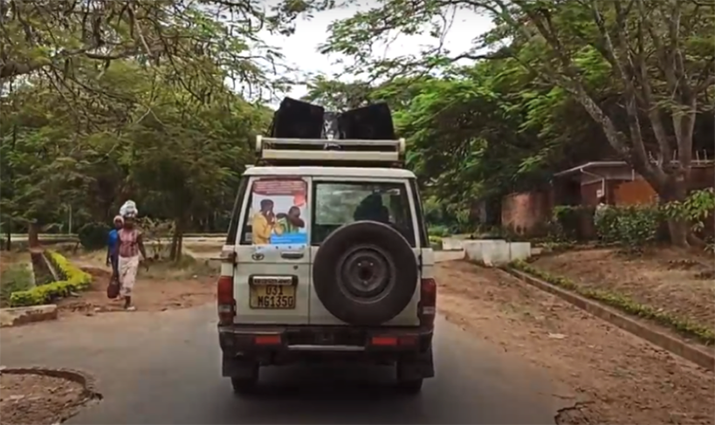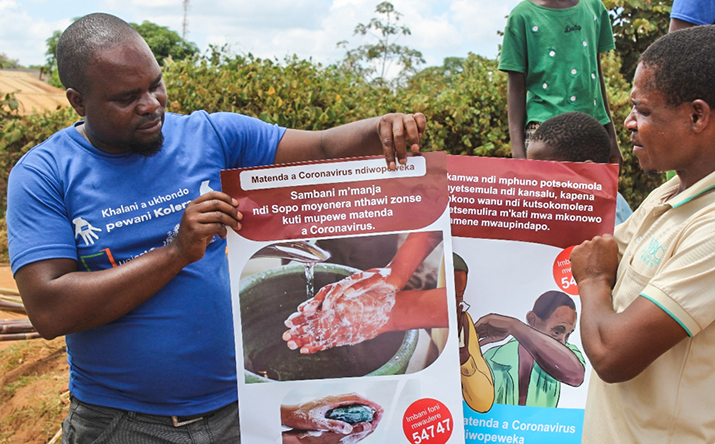Amidst Rise of COVID-19 Cases, Malawi Battles Misinformation and Fear
Amidst Rise of COVID-19 Cases, Malawi Battles Misinformation and Fear
Story and photos by Rejoice Phiri, Communications Manager, ONSE Health Activity
![[Two women wash their hands outside Nathenje Health Center.] {Photo Credit: Rejoice Phiri/MSH}](https://msh.org/wp-content/uploads/2020/05/img_0094_715px.png)
Malawi’s media is awash with the COVID-19 pandemic, which has changed daily life in the country, as well as worldwide. Unfortunately, some of that information appearing in the media is misleading or entirely untrue and can cause more fear than relief in people’s lives.
“I hear when you have it, your whole body becomes covered in boils and you do not heal from it,” says a woman visiting Nathenje Health Center, about 30 kilometers from the city of Lilongwe, sharing what she had heard about the virus in nearby villages. Another woman speaks up: “I have heard we should not dare to touch any part of our faces at all. So, if my nose is itching, what do I do? And if I can’t touch my mouth, how will I eat? All this is so scary and confusing. I am surely going to die because I have broken all these rules.”
Getting the correct public health information out to individuals and community leaders is absolutely necessary for an effective community response. The USAID-funded Organized Network of Services for Everyone’s (ONSE) Health Activity is currently supporting the Ministry of Health and Population (MoHP) alongside partners like Health Communication for Life (HC4L), Malawi Red Cross, Plan International and others to carry out a massive, nationwide communications campaign to fight misinformation. The campaign includes radio broadcasts, health talks at health facilities, community dialogues, and the distribution of printed materials to increase community awareness of COVID-19 and behaviors that prevent its spread.

Since mid-April, the MoHP has been deploying Land Cruisers with loud speakers to urban and rural areas of Lilongwe to share information about the virus, including what COVID-19 is, how it spreads, and what to do if displaying symptoms. According to Violet Chirambo, ONSE’s District Coordinator for Lilongwe Central West region, “The operational support provided by the program, in the form of fuel and lunch allowances, allows the awareness campaigns to reach these areas with up-to-date guidance and information about COVID-19 and how communities can prepare and protect themselves against the outbreak.”
Due to its pattern of spread within mostly urban areas, COVID-19 was first regarded as a disease of the rich, however, “Malawi now exhibits both urban and rural patterns for the spread of COVID-19,” explains Rudi Thetard, ONSE’s Chief of Party. And these patterns “are likely to have different implications for managing the epidemic.” Thetard emphasizes that more community outreach and sensitization is needed to help communities understand and respond to the disease. “In Chikwawa District, for example, the community expressed fear about keeping the affected individual in the community while there was also resistance toward creating an isolation unit at the district hospital,” says Thetard.

Malawians are eager for accurate information on how to keep themselves and their families healthy. Amos Jemison, a farmer who had come to sell his produce at the Nsungwi market, took a flyer distributed by the awareness campaign team and started reading it with enthusiasm. “This is what I was looking for. In my community there are a lot of myths regarding this pandemic. Now I can go back and share this flyer with them so that they can read it themselves,” says Jemison. “Do you have any more that you can spare because I want to share one with my traditional leader, too?”
Outbreaks start and are stopped at the community level and ensuring that community members are knowledgeable about the pandemic and confident in their abilities to respond appropriately is a very important first step in saving lives and curbing it’s spread.
Related:
USAID ONSE Project is on the Frontlines of Malawi’s Response to COVID-19